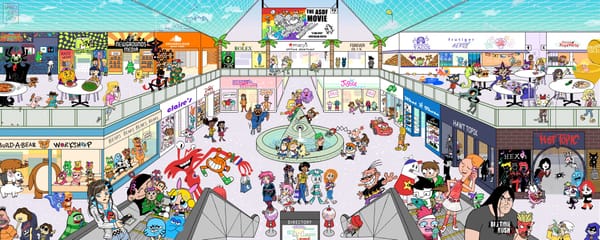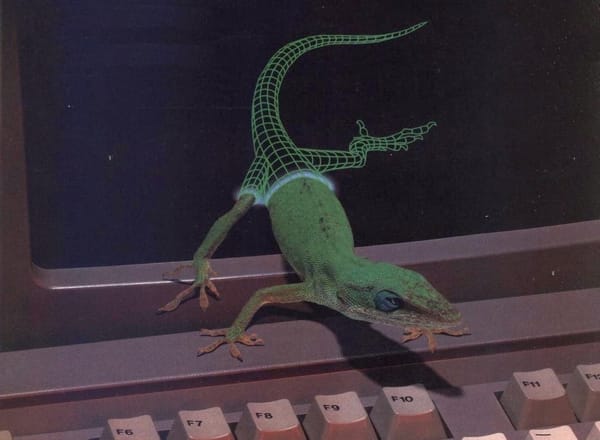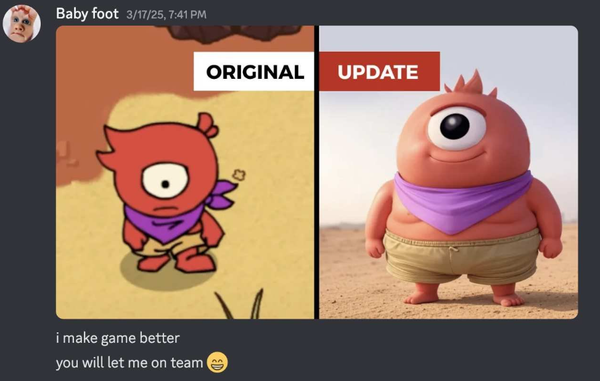The golden age of rap producer tags
It’s quite likely that you and I are both thinking of the exact same thing right now.

When I hear a producer tag that I like, I feel like I could run through a brick wall like the Kool-Aid Man. I'm not joking: it's probably my favorite individual thing to hear in contemporary popular music. My most-listened to album of this year is MIKE’s collaboration with the Brooklyn producer Tony Seltzer — who also produced what was my most-listened to album of last year, a full-length collaboration with Wiki — in part because of the absolute delirium Seltzer’s producer tag inspires within me. Join me as I re-listen to the “AY TONE” drop at the :02 mark in “Lethal Weapon”:
I want to inject that into my veins. I knew the first time I heard Seltzer’s tag that it came from The Sopranos, in which various characters shout “‘ey Ton’” at the mafia don as he busts balls, eats cold cuts, and breathes heavily at people. Turns out I was wrong: In an interview with The Rap Music Plug Podcast, Seltzer details how he conceived of the Tony Seltzer alias alongside the tag, but couldn’t find the perfect clip when he went searching through The Sopranos archives. So instead he called his dad up and had him record the “Paulie Walnuts hanging out of a car”-style vocal clip, pitching the result down a little. Which is sort of perfect. Seltzer’s production nods toward the early-‘00s east coast bombast of Just Blaze and The Heatmakerz as it exists in your memory rather than in actuality. Of course his signature tag would be a Sopranos clip that never actually happened.
The fact that he came up with his producer alias and tag at the same time has to be part of the reason that it works so well. This is pretty much standard practice these days. Producer tags (also called audio drops, beat tags, and DJ drops, variously) have become an essential element of a producer’s artistic personality and — dare I say it — brand. XXL and Complex both have massive, intermittently updated compendia of popular tags. On YouTube, you can find vaguely toxic rap pundits and stocking-capped dudes debating producer-tag tier lists. Kyle Beats has a pretty entertaining video in which he pranks a couple of rappers by playing them beats with increasingly wack tags. Elsewhere you can consume tutorials on making your own producer tags, which point toward an entire marketplace of producer-tag voice talent out there. There’s even a company called Voice Tag Gods that lets you choose between nine different vocalists, ranging from $15-$25, who will record your tag for you. Only one of the two child actors on offer stipulates that they will not record curse words.
While there’s some debate over the “first” producer tag, it’s easier to think of it as something that just emerged from the fundamentals of hip-hop itself, evolving alongside the internet. Back when the line between producer (a person who actually constructs a beat) and DJ (a person who scratches and remixes records in a live context) was a little more blurred, you had people like Funkmaster Flex making his mark on performances by grabbing the mic to shout his own name and drop atomic-bomb sound effects. Around the turn of the millennium, superstar producers like the Neptunes and Timbaland started to become as well-known as the artists whose names were on the record, and they began to lean into sonic calling cards, like the Neptunes’ four-count lead-in.
Just Blaze says the first time he shouted his name on record was Cam’ron’s iconic 2002 single “Oh Boy”; throughout the ‘00s, you had DJs like Don Cannon, DJ Khaled, and DJ Drama shouting their own names prolifically across various iconic Datpiff mixtapes. Gradually they became individual audio elements that producers wove right into the beat. You might point to Zaytoven’s trap dominance around the late-‘00s and early ‘10s as a key turning point, or the “Bangladesh” tag on the world-swallowing beat for “A Milli,” or the way Lex Luger folded a signature hype-building synth run into his brief reign of terror.
Regardless, I think the real event horizon of producer-tag dominance came in 2016, when Kanye released “Father Stretch My Hands Pt. 1.” Many lists of the best producer tags feature Future muttering “If Young Metro don’t trust you, I’m gon' shoot you” as the greatest of all time, an assertion with which I must respectfully disagree. But its appearance on Life Of Pablo’s earth-shattering opening fanfare is undoubtedly the best individual use of a producer tag of all time, a demonstration of Kanye’s immutable skills as an arranger and synthesist of preexisting elements. Kanye, at any given moment between 2001 and 2016, was hungrily and omnivorously searching for new sonic ideas to weave into his quest for global dominion, pulling in Jon Brion pianos to open hip-hop's palette and pulling in Pusha T to drop his masterpiece’s thesis statement. And so “Father Stretch My Hands” is a track built around the very literal glory of Metro Boomin’s producer tag, centering the then-rising beatmaker’s sonic signature as the record’s Big Bang, from which an hour of music explodes in ecstatic waves. So elated is the listener after that tag’s drop that it doesn’t even matter that Kanye almost immediately sullies the mood by singing about a model’s asshole.
The rise of Soundcloud rap around the same general era led to an evolution in hip-hop that was a little more genetically infused with the internet itself. Thanks to Soundcloud’s then-novel reliance on algorithmic curation, tracks and even track snippets could go viral in a way that was previously reserved for, like, deep-fried memes. So producer tags, normalized over the course of decades, became a way for producers to not just claim their work in a crowded landscape of remixes and recontextualizations but also to assert a fundamental authorship of the work, on par with or even superseding the authorship of the rapper. The best of the new crop of producer tags that emerged from this moment feel seamlessly interwoven with the producer’s overall aesthetic vision. It’s quite likely that you and I are both thinking of the exact same thing right now.
I think of Pi’erre Bourne’s production as a cartoon funland of sound, full of sproinging synthesizers, squiggly woodwinds, and funhouse samples, all stretched across precision-engineered hi-hats and pneumatic kick-drums. His tag’s Jamie Foxx Show clip — “yo Pierre, you wanna come out here,” followed by an analog door-opening sound effect — is the perfect accompaniment to this, at once silly and invitational, with that creaking-door sound somehow making its way repeatedly into his actual tracks. You barely even know what it’s doing to your brain on something like Young Nudy’s “Mister” but it’s doing something powerful. Remember when I said the “Young Metro” tag wasn’t the best ever? Well, Pi’erre’s why.
Or is it? I have found myself screaming “Conductor, we have a problem here!” with the same dazed incredulity as the viral video from which throwback boom-bap connoisseur Conductor Williams originally pulled it. Williams is absolutely insouciant with the tag, cutting it into a dense collage on Conway The Machine’s “Believe Me,” for example, and hitting listeners with it immediately upon entry to his big Drake cosign and countless Westside Gunn scorchers.
I have a lot of favorites, maybe; this is not an area in which I am consistent or logical. I have spent an absolutely ridiculous amount of time over the past few years listening to Tony Shhnow, an Atlanta plugg mainstay who has an almost Curren$y-esque level of quality control. That’s how I came across the “I really like to use cash” tag of the producer CashCache, which falls into the producer-tag cliche of a woman seductively saying the producer’s name, but in this instance also suggesting some sort of lifestyle preference for this specific vehicle of currency exchange. Like, is it cooler to use cash? I don't know. I'm considering it now.
Tony Shhnow is also how I was introduced to the producer tag of Carlo Anthony, who uses a King Of The Hill clip of Hank intoning, incredulously, “Who the hell is Carlo?” I am made almost indescribably happy when I hear this.
What else do I love. I love it when Kenny Beats drops that “Whoa, Kenny” tag that pops with the clarity of the producer’s almost inconceivably immediate drums.
I love it when I hear “la musica de Harry Fraud” on a Harry Fraud track, which is, yes, another example of the “have a woman say the producer’s name, but make it hot” school of tag construction, but which fits Fraud’s leather-interior aura perfectly:
I like it when Jpegmafia filters a keening “damn Peggy” into one of his dense tableaus. (His WWE pull "you think you know me" also has a very high hit rate.)
I really, really like it when I hear the “damn son, where’d you find this” tag, which only sort of counts, since it was originally used by Trap-a-holics during the Datpiff era but has since become an all-purpose meme signifying DJ tags in general. You can actually hire the "damn son where'd you find this" guy to say whatever you want. Anyway, every time I hear it I want to Kool-Aid Man right through a wall, so I'm including it.
There are more. There are, in fact, too many more. There’s a reasonable chance that you’re mad that I haven’t talked more about, say, Tay Keith or Southside or “Oh lawd, Jetson made another one!” or ChaseTheMoney or “cook that shit up Quay!” or “Cardo got wings,” the last of which is literally about Cardo eating chicken wings. I’m not trying to list every producer tag — I’m trying to make clear that we have entered a golden age of producer tags, the emergence of a new aesthetic property that is both fundamentally utilitarian and deeply expressive.
This convergence feels right for hip-hop, which has always welcomed hardscrabble self-promoters and rewarded innovation. That’s a little bit of what you hear when a producer places a tag for maximum impact in a beat: an artist shouting their name into the endless void of the internet. If you listen to it, if you like it, if you hit repeat, if you nod with recognition the next time you hear that tag — you get to be a part of the echo. The producer tag is a sort of time-displaced call-and-response optimized for the labyrinthine information pathways of the modern internet. I'm merely inviting you to enjoy shouting along with me. And Tony Seltzer’s dad.
///
If you liked this article, consider supporting EX. The best thing you can do is subscribe or, if you’ve already done that, recommend us to a friend or two. Just forward this email or post it on social — honestly, that makes a huge impact.
If you’ve already done that and want to support us further, you can pledge a donation by clicking in the top-right corner and viewing plans from your account. We promise not to spend it on producer tags.






